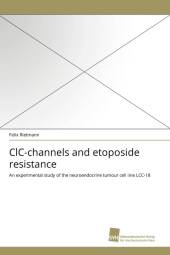 Neuerscheinungen 2011Stand: 2020-01-07 |
Schnellsuche
ISBN/Stichwort/Autor
|
Herderstraße 10
10625 Berlin
Tel.: 030 315 714 16
Fax 030 315 714 14
info@buchspektrum.de |

Felix Rietmann
ClC-channels and etoposide resistance
An experimental study of the neuroendocrine tumour cell line LCC-18
2011. 60 S. 220 mm
Verlag/Jahr: SÜDWESTDEUTSCHER VERLAG FÜR HOCHSCHULSCHRIFTEN 2011
ISBN: 3-8381-2530-4 (3838125304)
Neue ISBN: 978-3-8381-2530-5 (9783838125305)
Preis und Lieferzeit: Bitte klicken
Drug resistance constitutes a major challenge in the treatment of metastatic neuroendocrine cancer. Chemotherapeutic regimes for these tumours employ weak-base drugs such as etoposide. Especially for this medication, a mechanism of resistance was suggested that linked increased acidification of intracellular compartments to the evolution of drug resistance. So far, most research groups have focused on the role of the driving force behind compartmental acidification, the vacuolar H+-ATPase, in drug resistance. However, chloride channels of the ClC-family also play a pivotal role in the pH homeostasis of cellular organelles, and recently the first evidence for a potential role of ClC-3 in drug resistance was given. Following this finding, this work aims to further elucidate the role of ClC-channels and compartmental acidification in the evolution of etoposide resistance. In this context it focuses on the question of whether an up-regulation of intracellular ClC-channels can be observed as a cellular response to chemotherapeutic drugs and whether it will entail increased compartmental acidity and thus contribute to the evolution of drug resistance in vitro.
Felix Rietmann, Dr. med., has studied medicine in Berlin,Toulouse and Paris, andHistory of Science, Medicine and Technology in London. He iscurrently working as a paediatrician at the CHUV in Lausanne, Switzerland. His researchinterests include childhood health and development as well as the history andphilosophy of science and medicine.


